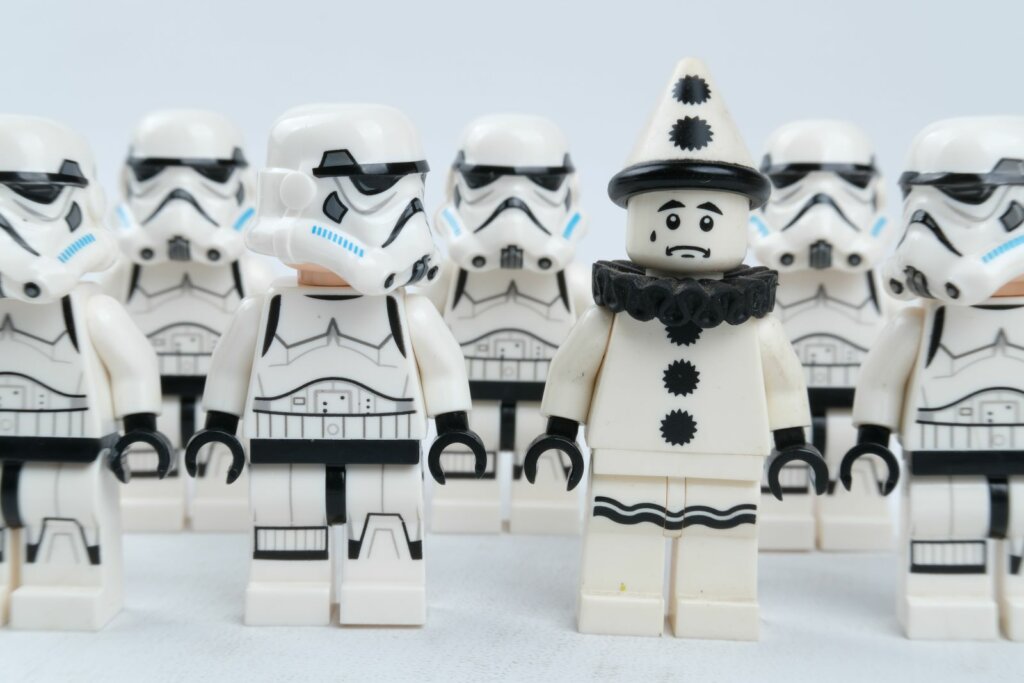In April, I wrote a blog for my professional website called “Maybe It’s You” about how I realized after getting rejected by every single literary agent I queried that maybe the problem was me. This is the companion piece to that blog recognizing maybe it’s not me that’s the problem; maybe it is the other person.
When it comes to interactions with other people that go awry, I frequently place the blame on myself. “What did I do wrong? Should I have said XYZ instead?” Call it a carryover from being labeled “weird” my whole life and struggling to fit in. Who knows? Regardless, when other people are unhappy, frustrated, uncomfortable, etc. I am quick to take responsibility.
In one of my recovery programs, there are two sayings that feel apt right now: “You are probably not guilty” and “You can be healthier than those around you.” Both of those statements are revelations. Typically, I’m my own worst critic playing judge, jury, and executioner before you can blink. I’m probably not guilty? It’s possible I didn’t do anything wrong? Really?
For the other saying, that I can be healthier than those around me, it’s also hard to wrap my mind around. As someone who is in recovery, seeing a therapist, and generally working on herself, I have this perspective that I’m the sickest person in the room. Everyone else knows what they’re doing, they’re normal, they’re fine. I’m the problem. The irony is after doing all this work on myself it’s become the opposite: In some situations, I am healthier than those around me because I know how to handle my own emotions. For instance, instead of asking you to stop feeling a certain way so I can feel better, I recognize when I’m activated and can do the work to process that.
Because I’ve done so much work on myself to heal my wounds and become emotionally mature, I forget not everyone else is like that. I forget someone can say, “I don’t like the way you did that” and it truly has nothing to do with me. The other person is triggered and trying to place all the blame on me instead of taking ownership of themselves. It’s so very easy to do in our society and we see evidence of this all the time.
Just a few days ago people advocated boycotting Hershey because the company featured a trans woman in an ad. Instead of dealing with their discomfort over trans people, conservatives said, “Boycott.” Why are they upset? I truly don’t understand because if they don’t want to be a trans woman, they don’t have to be, but anyway, instead of processing the discomfort within themselves, Hershey became bad and wrong. Is Hershey the problem here? Given my progressive bent, of course I say no, they aren’t.
This blog is a reminder to me and to anyone who needs to hear it that as much as you resonate with Taylor Swift’s song “Anti-hero,” maybe you’re not the problem. Maybe it’s not you. Maybe the other person is triggered or hasn’t dealt with their own discomfort or has unrealistic expectations or is scared of vulnerability or. . .Maybe you didn’t do anything wrong and in fact, you are the healthier person in the situation.
I dream of a world where we recognize sometimes we aren’t the problem; sometimes it’s the other person. A world where we understand we can be healthier than those around us. A world where we remember other people get triggered and haven’t dealt with their wounds and that’s on them no matter how much they try to place the blame on us.
Another world is not only possible, it’s probable.
This is a repost from October 2014 when I was living in Missouri.
My recovery mentor often says to me, “God is slow but always on time. When it’s time, he moves fast so be ready.” Today I’m marveling at how true that is, particularly because I’m in a place that has seasons. In the Bay Area, there are two seasons: the dry season and the rainy season. Missouri has a proper spring, summer, fall, and winter.
Last Wednesday, I was in shorts and a t-shirt, dipping my legs in the lake. The very next day we had a thunderstorm replete with rain and lightning and then it was cold. Like, pull-out-my-fall-jacket cold. Like, turn-the-heat-on cold. It went from summer to fall in the course of a day. I realize comparing change to the seasons is not so valid anymore, considering that today the temperature is back up to the 70s, but change happens quickly in life too.
I read an interview about the recently departed Joan Rivers whom I’d always unfairly dismissed as a mean-spirited comedian. There was a point in her life when she was blacklisted from The Tonight Show, her husband Edgar had killed himself, and her career was floundering. She seriously contemplated suicide.
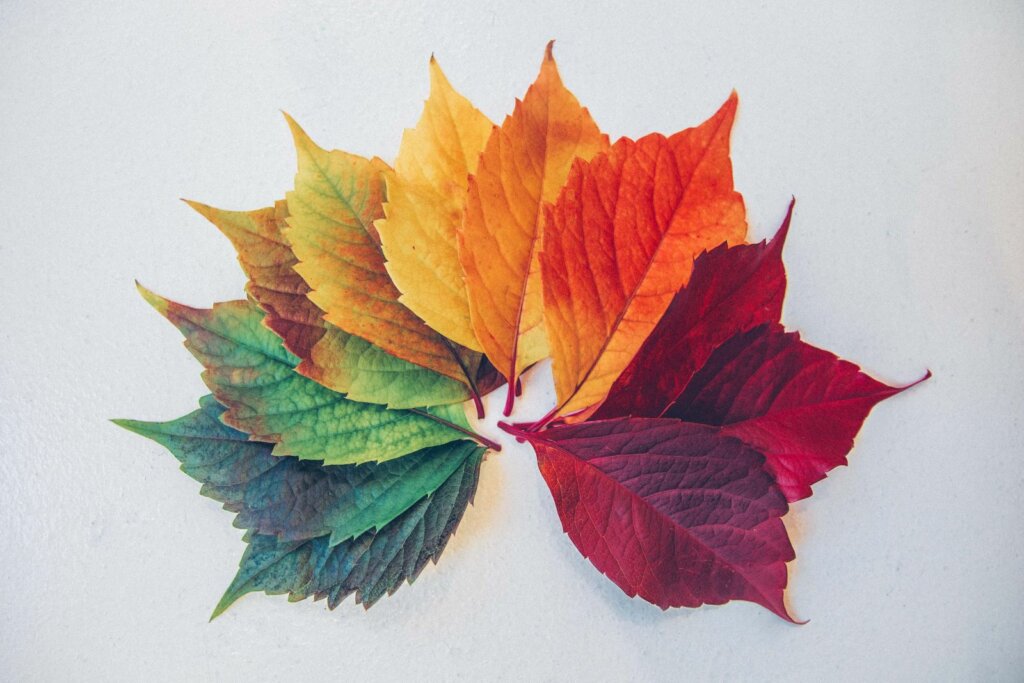
What an excellent picture. Photo by Chris Lawton on Unsplash
She said, “What saved me was my dog jumped into my lap. I thought, ‘No one will take care of him.’… I had the gun in my lap, and the dog sat on the gun. I lecture on suicide because things turn around. I tell people this is a horrible, awful, dark moment, but it will change and you must know it’s going to change and you push forward. I look back and think, ‘Life is great, life goes on. It changes.’”
As we all know, Joan went on to have a successful career and a rich life, but there was a point when she was thinking about ending it all. I also reflect on the turn of events for friends of mine. They’re getting married this winter and they didn’t even know each other a year ago! They met in the winter of 2013, got engaged in June 2014, and now they’re getting married.
Even in my own life, I’ve seen how change happens quickly. One day I was settling into my new abode and within an hour a sweet situation turned sour and I started making plans to live elsewhere.
I often think change happens painfully slowly, that it’s gradual – and that is certainly true – but sometimes it also happens quickly, and we have no idea it’s coming even 10 minutes prior. At this point in my life when things are so up in the air, when I have no idea where I’ll be next, what will happen next, what lies before me, it’s heartening to remember my life won’t always look this way. That change happens on the universe’s timeline, and when it happens it can happen fast so I need to be ready.
I dream of a world where we remember the only constant in life is change. A world where we realize the way things are now is not how they’ll always be. A world where we understand our troubles pass sometimes quickly and sometimes slowly. A world where we hold dear the truth that when it’s time for something to happen, it happens fast so it’s up to us to be ready.
Another world is not only possible, it’s probable.
Two sports stories from around 20 years ago are on my mind because my friend showed me the videos of them: that of speed skater Steven Bradbury and swimmer Eric Moussambani. Their stories are amazing if you’re unfamiliar with them. In 2002 at the Salt Lake City Winter Olympics, Bradbury lagged behind the other skaters by a large degree and was nowhere near placing in the top three. Then at the final lap, all of the top-four skaters crashed into one another. That let Bradbury literally glide into first place.
He went from dead last to winning the gold on a fluke. What happened to Bradbury was so incredible that his name has become an idiom. When someone stumbles their way into first place or success, it’s called, “Doing a Bradbury.”
The other story on my mind is Moussambani’s at the 2000 Summer Olympics. He hails from Equatorial Guinea and entered the Olympics via a wild card. He had never seen an Olympic-sized swimming pool before the day of his heat and trained mostly in a lake. He swam the slowest time in Olympic history during his 100 m freestyle but he still won because both of his competitors were disqualified due to false starts. He didn’t advance to the next round but he set a new personal best and an Equatoguinean national record.

The barrier between this pool and the ocean is thin, just like with humans and Source. Photo by Kate Trifo on Unsplash
Moussambani’s story is another example of an unlikely victory stemming from a fluke. In the U.S. anyway, we have this idea you can only win if you’re the very best. It’s all about the cutthroat competition and no room for the recognition there are other forces at work in the world that can also result in a person succeeding.
Yes, these two men were Olympic athletes, they obviously put in the work. Bradbury in particular spent 14 years speed skating and suffered a life-threatening accident and a broken neck two years before his gold medal. Moussambani spent hours training as well. He didn’t sit on his couch and magically get transported to the Olympics. They put in the footwork but something beyond their personal will and grit landed them their victories.
Personally, I’d call it destiny because my spiritual teacher says there are no coincidences. Things don’t just “happen.” He says, “For each and every incident there is some cause.” We may or may not know the cause, but that doesn’t mean there isn’t one. He gives the example of an earthquake saying perhaps a huge stone took 10 million years to move from one place to another, but when it fell, the action took only a few seconds and caused the earth to shake. The cause took 10 million years to come to fruition but there was a cause for the earthquake.
I take comfort in hearing the stories of Bradbury and Moussambani because it reminds me if something is meant to be, it will happen. There will be a “fluke,” a “chance encounter,” or some other form of “luck” to ensure what is meant to happen to me and for me, does. As long as I continue to show up for my metaphorical race, my higher power will do the rest.
I dream of a world where we remember we are in partnership with the divine. A world where we understand there are no coincidences. A world where we recognize what is meant to happen to us, will. A world where we revel in the magic of supposed flukes, seeing them for the helping hand that they are.
Another world is not only possible, it’s probable.
This repost is from almost exactly six years ago but is still relevant today. Enjoy.
I had a dream the other night my sister, Rosie, and I slept in the same bed. She started hogging all the covers and I yanked them back from her and said, “No. You can’t take all the covers.” It’s not a dream based on reality but nonetheless, it got me thinking about greed, especially as it relates to the world’s resources. A group of people is hogging almost all the resources leaving the rest of us shivering in the cold.
Activist Peter Joseph said, “The value system disorder of rewarding, in effect, generally the most ruthless and selfish in our society, both by financial means and then by public adoration and respect, is one of the most pervasive and insidious consequences of the incentive system inherent to the capitalist model.”
I’m with you, Peter. By and large, we as a society seem to be OK with greed as long as it comes from a place of power. No one bats an eye when we hear about corrupt politicians or businessmen engaging in shady backroom deals. In fact, I think we expect it. We’ve become so used to greed and selfishness it seems normal. In a way, it is normal. We all have the same tendencies within us. In yogic philosophy, these tendencies are called vrttis.

Let everyone have a piece of the pie. Photo by Erol Ahmed on Unsplash
My spiritual teacher says, “The correct way to get rid of depraving tendencies is not to repeat to oneself that I shall avoid this tendency or that. Suppression is not the proper way to weaken these tendencies. Do not suppress, but channelize. Humans are psychic beings. Reconvert the psychic into the spiritual. Let elevating tendencies be converted into a spiritual wave.”
My point in using that quote is to say yes, we all have the capacity for cruelness, greed, selfishness, but that doesn’t mean we say, “Oh well. It’s natural. Let it do its thing.” No. As human beings, we are constantly evolving and that means using rationality, it means channelizing our natural propensities toward something else. If I want to strangle a cat, instead of acting on that impulse, it’s better for me to rip up a phone book, or scream into a pillow. The same is true, and can be true, for greed.
I realize not everyone is interested in converting their natural impulses, that’s fine, but it means we as a society have to impose laws and sanctions. We already have consequences for things like murder and theft, why don’t we have consequences for hoarding wealth? Why do we instead encourage it? I already know the answer to that question, but I’d like to go back to my dream.
If Rosie and I were still children living at home, what would happen if we started bickering about the bed covers? Our parents would come in and either make us share or give us separate bed covers. They would come up with a solution – they wouldn’t say, “Oh well. It’s human nature to be greedy Rebekah, get over it. You’ll just have to shiver.”
I’m proposing that we all start acting like parents, coming up with solutions that work for all of us. I’m proposing that we act like adults and say, “No” to people who want to hoard all the covers, so to speak, and instead encourage a fairer share.
I dream of a world where we work together to curb the natural impulse toward greed. A world where we say “No” to hoarding wealth. A world where we understand we can channelize our natural tendencies into something else. A world where we ensure people receive a fair share.
Another world is not only possible, it’s probable.
One of the most striking things for me about being in Australia is not the accent or driving on the left side of the road, it’s their take on security. Going through airport security for domestic flights is a breeze – you leave your shoes on and there aren’t any restrictions on liquids. You’re required to remove your electronics but that’s it. Done.
When I visited the National Gallery of Victoria, I was confused because not only is the art museum free (except for certain exhibitions), there is no security check. Nobody rifled through my bag, and no one yelled at me for wearing my backpack on my back instead of on one shoulder. In contrast, the Met in New York specifically mentions both of those things on its website. Australians aren’t particularly worried about weapons because they don’t need to be.
Shortly after a mass shooting in 1996, elected officials banned semi-automatic and other military-style weapons across the country. On top of that, the federal government prohibited their import and lawmakers introduced a generous nationwide gun buyback program, funded with a Medicare tax. Many years later, lawmakers added a new National Handgun Agreement, a separate buyback act, and a reformulated gun trafficking policy to their legislative arsenal.
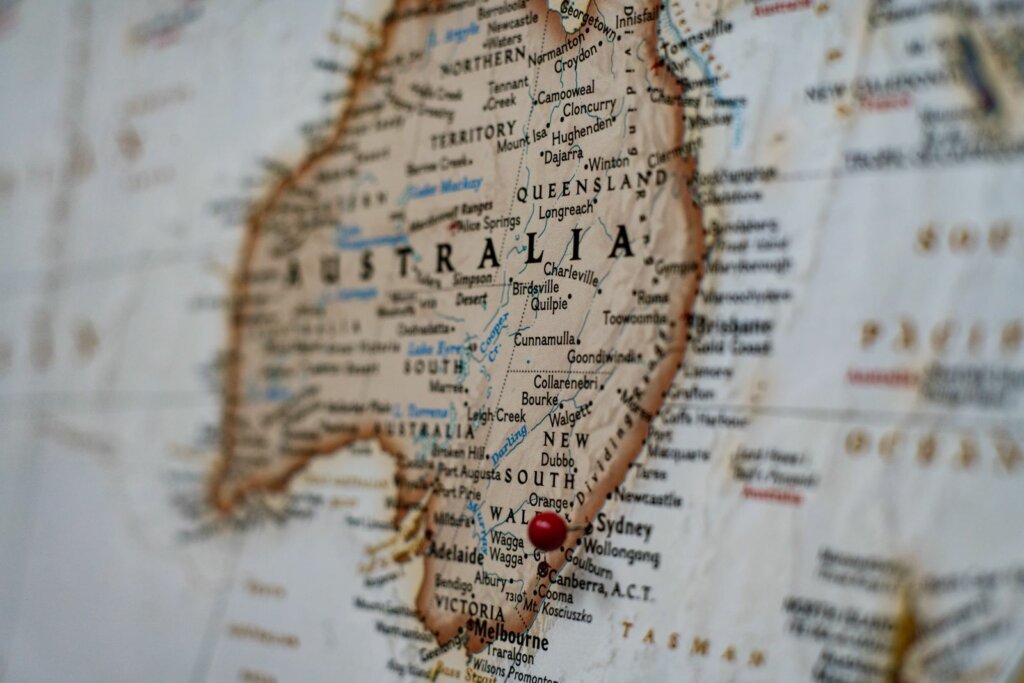
I wish the U.S. was more like Australia in some ways. Photo by Joey Csunyo on Unsplash
The result? Gun violence declined to a vast degree. In 2014, the latest year for which final statistics are available, Australia’s murder rate fell to less than 1 killing per 100,000 people. In contrast, the murder rate in the U.S. in 2020 was 6.5 killings per 100,000 people. And just in case you didn’t know, we had 647 mass shootings in 2022 alone.
People remind me the risk of being a mass shooting victim is low, statistically speaking, but you know what’s not low? The constant vigilance we live with as a society. There are reminders on public transit to say something if you see something. There are extensive security measures at the airport. We search people’s bags in certain public spaces and we have active shooter drills in schools. In other words, Americans are always on high alert for an attack, whether they’re aware of it or not.
Coming to Australia, I feel myself relax in a way I’ve never been able to the U.S. Yes, I could be stabbed, but frankly, I’d rather confront a knife than a gun. Why do we cling to our second amendment rights so fiercely? Some act as if the second amendment is a bulwark against tyranny when in reality, we’re already in a plutocracy or the reign of the rich.
The founding fathers weren’t some demigods who knew the best course of action for all of eternity. They were flawed human beings and their ideas about gun ownership are no longer relevant nearly 250 years later. How could they be? For context, at the time the founding fathers drafted the Bill of Rights, they couldn’t even conceive of indoor plumbing. Why are we still hanging our hats on their outdated ideas?
My spiritual teacher says, “Social ideals and systems should be formulated after considering the time, place, and person as well as the all-round progress of the society. It may be that something which is quite useful for a particular time, place, and person is totally worthless for a different time, place, and person. Society is not a static entity, but a dynamic one.”
Society is a dynamic entity, which means we can say, “You know what? We’re safer with fewer guns. Who cares what some long-dead white dudes said 250 years ago? Their ideas are no longer useful.” It can be done; we have a modern example in Australia and I have to tell you, I’m a fan.
I dream of a world where we remember society is a dynamic entity, which means recognizing ideas outlive their usefulness. A world where we remember we don’t have to cling to outdated beliefs. A world where we let Australia serve as an example of how to handle gun violence.
Another world is not only possible, it’s probable.
Whenever I share about my upcoming Australia trip, people are genuinely happy for me. I’m taken aback because sharing good news, especially over social media, seems perilous these days. A year or so ago, Glennon Doyle shared a video of her singing on a boat with her friends and family. The next day, she had the single-largest drop in followers her entire time on Instagram. She posited it’s because there’s something triggering about seeing women, especially, happy. That perhaps we’re more comfortable with their pain and suffering.
More recently in October, Daisey Miller shared a tweet that said, “my husband and i wake up every morning and bring our coffee out to our garden and sit and talk for hours. every morning. it never gets old & we never run out of things to talk [about]. love him so much.” Some responses were positive but many were scathing and called her out for being privileged and presumably wealthy. There was an assumption Miller didn’t work and had minimal responsibilities.
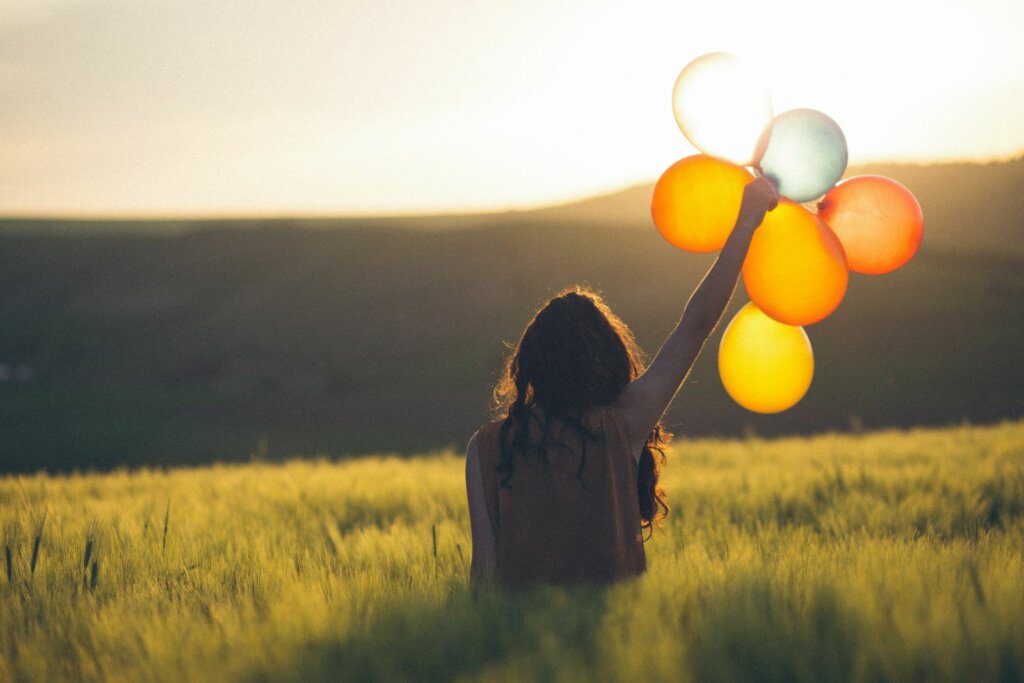
Happiness increases when it’s shared. Photo by Catalin Pop on Unsplash
In other words, instead of celebrating Miller’s quality time with her husband, people tore her down and mocked her. Numerous people tweeted their own versions: “my husband and i wake up every morning and go out to our garden and swordfight for hours. every morning. it never gets old & we never run out of ways to duel and spar. love him so much,” or “my husband and i wake up every morning and go out to our garden and we kill each other with our bare hands because we are miserable and we both have crabs.”
Those that didn’t mock her showcased self-righteousness, which is the conviction that one’s beliefs and behaviors are the most correct. As John Mark Green puts it, “The self-righteous scream judgments against others to hide the noise of skeletons dancing in their own closets.” Twitter is rife with self-righteousness and a hotbed of schadenfreude, a compound of the German words schaden, harm, and freude, joy. It means deriving pleasure or joy from someone else’s suffering or misfortune.
Brené Brown writes in her book Atlas of the Heart that schadenfreude is “seductive. Especially when we’re sucked into groupthink. It’s easy to build counterfeit connection with collective schadenfreude. I say ‘counterfeit’ because when we see someone who we don’t like, we disagree with, or is outside our group stumble, fall, or fail, it’s tempting to celebrate that suffering together and to stir up collective emotion.”
I mean, I get it. I’ve felt schadenfreude from time to time. But that doesn’t mean schadenfreude has to dominate your life. The antidote to schadenfreude is freudenfreude, a word made up by an American psychologist that literally translates as “joy joy.” It’s letting yourself feel vicarious joy for others. When we share our joy, our joy increases. The Buddha stated this well when he said, “Thousands of candles can be lighted from a single candle. Happiness never decreases by being shared.”
I have to remind myself of that because I worry by sharing my good news people will judge me, one-up me, or try to tear me down. Thus far they haven’t, probably because I’m not famous and I don’t surround myself with jerks. It could also be that I engage in freudenfreude regularly. I really and truly celebrate when others celebrate. Seeing their joy brings me joy and perhaps that’s why it’s coming back to me. Together, we are multiplying happiness.
I dream of a world where we celebrate each other’s wins. A world where we practice freudenfreude more than its opposite. A world where we remember happiness doesn’t decrease when it’s shared, instead it’s multiplied.
Another world is not only possible, it’s probable.
Lately, I’m noticing how much I catastrophize. Catastrophizing is assuming that the worst will happen. It can also be believing you’re in a worse situation than you really are or exaggerating the difficulties you face. For me, it’s the former, assuming the worst will happen. I don’t catastrophize every situation. The ones that I feel are within my control I’m optimistic about. For instance, I’m not someone who says, “I’ll miss my flight!” because I know I leave plenty of time to get to the airport.
My catastrophizing is along the lines of “My plants are going to die while I’m in Australia!” I’m setting up a water-wick system for my indoor plants but nonetheless, I’m pretty convinced it will fail. And the idea of asking someone to water them also brings catastrophizing, “What if they forget and my plants would have been better off with the water-wicking system?!?”
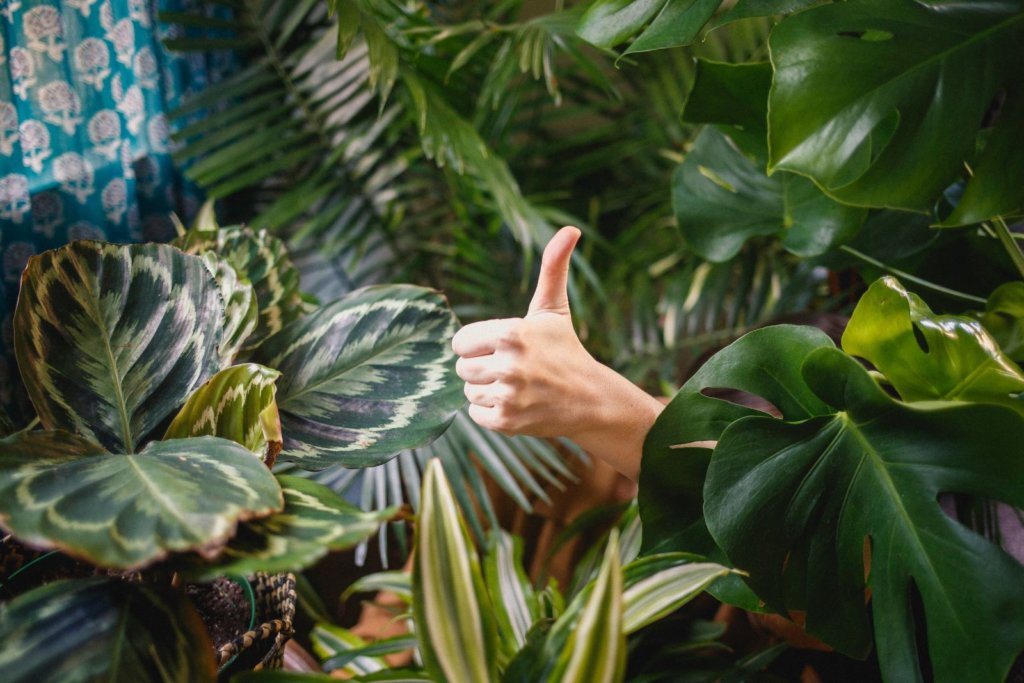
Maybe my plants will be fine! Photo by Katya Ross on Unsplash
As you can see, it’s loads of fun over here in my brain. A solution I keep circling is: “Give equal air time to things working out.” I care deeply about fairness so hearing it phrased that way helps me. I say to myself, “You’re not being fair and equal by only focusing on the negative. What if you devoted the same amount of time to things working out? What if your plants are healthy and thriving when you get back?”
Even asking those questions causes my brain to short-circuit a little because honestly, I hadn’t considered that possibility. What if everything works out? It’s true. Everything could work out. It’s just as likely my plants will be alive when I come back instead of dead. Why not focus on the positive outcome?
The brain is a muscle that needs training like the other muscles. I have to train myself to be optimistic and it’s something my spiritual teacher encourages when he says, “Human beings must not be pessimists under any circumstances. I am an incorrigible optimist, for I know that optimism is the very essence of life.”
That statement is backed up by science in the sense that optimists live longer, the Washington Post found. Optimists lived into their 90s versus the average life span of 83. And the results remained even after accounting for other factors known to predict a long life such as education level, economic status, ethnicity, and whether a person had depression or chronic health conditions.
Yes, it’s easier to default to the negative because after all, we humans are prone to a negativity bias, but why not at least give the positive equal air time? It’s only fair and could help me live longer to boot.
I dream of a world where we allow ourselves to catastrophize as well as positively visualize the future. A world where we remember positive and negative outcomes are both likely. A world where we train our minds to be optimistic. A world where we give equal airtime to the positive.
Another world is not only possible, it’s probable.
I feel contracted about money right now because the situation with one of my highest-paying clients is in flux. Not only that, I’m spending a lot of money all at once for this upcoming Australia trip. I didn’t know what I was signing myself up for, honestly, because I booked the ticket semi-impulsively. My response is wanting to hoard money like a dragon sitting on her riches. “Amass all the wealth! Spend none of it!” In other words, it’s a good time to remind myself of a concept I learned almost exactly three years ago: “It’s not your money.”
We’ve been socially conditioned to believe it’s our money, our house, our bodies, our whatever, but nothing is truly “ours” in a permanent way. We’re caretakers for right now and that’s it. If the concept doesn’t resonate with you, that’s fine, but I find it helpful to remember everything belongs to the divine beloved because it helps me feel more relaxed.
Whenever I think something is “mine,” I start grasping, controlling, and getting overwhelmed. If I think money is mine, I start freaking out when I spend it, want to stockpile it when I receive it, and worry about how to get more. I start wondering if I spent too much on the plane ticket, if I chose the wrong hotel, and maybe I should cancel this once-in-a-lifetime experience to stay home instead. It’s not fun and it’s also no way to live. Life is about giving and receiving. Not only receiving.
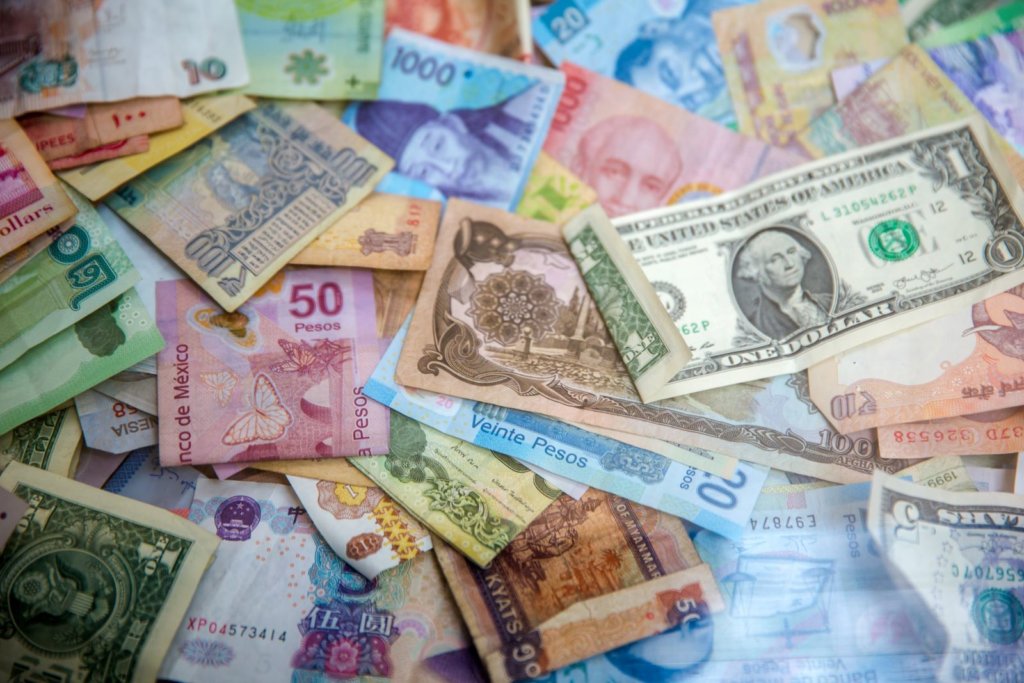
This isn’t ours. Photo by Jason Leung on Unsplash
The solution to the fear I’m feeling comes down to faith. Faith is not rational, scientific, or evidence-based. Faith is the opposite of all those things. It’s belief without proof. That’s not just my definition; the dictionary defines faith in the same way. That means I have to actively, consciously, choose to believe I’ll be OK financially speaking. That money will continue to flow in and out of my life and furthermore, it’s not mine to control anyway.
I’m reminded of a Sanskrit phrase for meditation, Iishvara prańidhána, or seeking shelter in the Supreme. My spiritual teacher says, “Iishvara prańidhána also implies implicit faith in [the divine] irrespective of whether one lives in momentary happiness or sorrow, prosperity or adversity.”
Essentially, that means letting your life belong to love, to quote Tosha Silver, the author of the book It’s Not Your Money. It means letting go of control and recognizing there is a divine presence here, at this moment, in every moment. It means remembering a loving force moves through me and you. Furthermore, I can consciously invite that loving force into my life. It means saying, “Hey God/higher power/universe, I want you to take care of this. Please guide my actions. I trust where you are leading me,” and then letting go, knowing whatever needs to come, comes, and whatever needs to go, goes.
It’s not easy by any means but neither is the alternative. I’d rather feel happy, joyous, and free than sad, depressed, and imprisoned. For me, that means trusting and surrendering.
I dream of a world where we remember nothing in this universe is truly “ours.” A world where we recognize there is a power and presence that’s in charge. A world where we put our trust in something greater than ourselves. A world where we’re able to surrender and let go of our micromanaging tendencies and fully trust all true needs will be met, and often in amazing and wonderful ways. A world where we understand it’s not our money.
Another world is not only possible, it’s probable.
The new year is typically when many people start to set resolutions of how they want this year to be. They want to change an aspect of their life or behavior. Resolutions abound such as: “I want to lose weight,” or “I want to make more money.” But how do those things actually happen? How can we make a change stick? After all, most people abandon their resolutions by February, and sometimes even earlier, so it’s clear that merely setting the intention isn’t enough.
My friend introduced me to a concept that’s blowing my mind a little called the Triad of Change. Think of the triad as a three-legged stool consisting of structure, behavior, and perception. You need all three for change to happen, but for the change to be long-lasting and sustainable, you have to start with the leg of the stool that’s most enlivening for you and end with the most draining part, otherwise, you’re sure to fail.
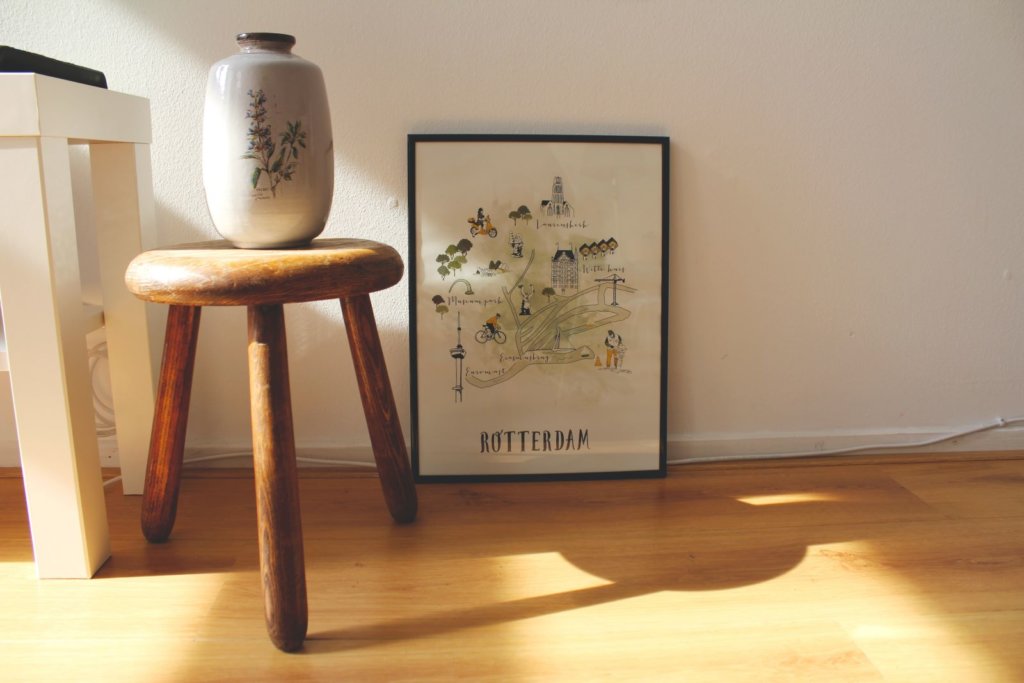
I like this picture because it captures both a stool and a feeling of movement with the poster in the background. Photo by John Boatile on Unsplash
Structure is the “where and how.” It’s budgets, plans, routines, etc. If you get excited by diving deep into the small details of life, start any change with structure.
Behavior is the “what.” It’s actions, activities, performance, etc. If it thrills you to just get out there and do something, start with behavior.
Perception is the “why.” It’s feelings, vision, purpose, meaning, etc. If you become animated thinking about how you want to feel, what you want to experience, or the big picture, start any change or decision with perception.
The triad of change is hugely relevant in my life right now because I notice I keep starting with my drain: structure. For instance, I’m flying to Australia soon, which is super exciting because the country has been on my bucket list for a long time. But instead of celebrating, I feel stressed and overwhelmed with all the details. “Should I book this Airbnb? What about that one? Would it be better for me to fly at this time or at this time? When should I plan the side trip to the Great Barrier Reef? Can I fit in a visit to Uluru?”
For some people, thinking about those details is enlivening. They clap their hands in glee wading through various Airbnb options. I am not one of those people. Making decisions from a place that’s invigorating for me, perception, means asking myself, “What do I want to experience?” and then going from there. I want to experience comfort so that means booking an Airbnb with air-conditioning. I also want to experience ease, and for me, that means being close to things, not in party central, but also not in the boonies. With that in mind, I found an Airbnb that meets my needs. I didn’t wade through 1,000+ listings or focus only on finding the cheapest place. I set myself up for success by honing in on what matters to me.
The Triad of Change concept is simple yet complex. I’ve found most of the literature about it online is esoteric, all of which is to say if you don’t understand what I’m talking about, you’re not the only one! You can message me if you want to talk about it in depth, but for the purposes of this post, it’s enough to ask yourself, “Which of the legs energizes me? What inspires me?” and then start from that place. You know what to end with by asking yourself, “Which of the legs drains me? What would I rather put off or outsource to someone else?”
Thus far this process is making my life easier and I have that wish for you too. Life is too short to feel drained all the time. Why not feel enlivened instead?
I dream of a world where we understand how to make a change stick. A world where we recognize the mechanisms that work for other people may not work for us. A world where we understand change doesn’t have to be hard or grueling, it can be easy and joyful. A world where we operate from a place that lights us up and we let that energy carry us through our days.
Another world is not only possible, it’s probable.
As we enter this new year, I keep thinking about envy. Not the way I normally do in that my chest burns with the emotion, aching to have what someone else does. Instead, I’m thinking about something my former therapist told me, “Someone out there envies you.”
When he first said that to me, I balked. “What?!? My platonic relationships are great, but don’t most people think that? Who complains that their friends are awful? Other than those relationships, how could anyone possibly envy me? I’m not wildly successful, I don’t have a boatload of money, I’m single, and I don’t even live in a large apartment! What is there to envy?!?”
The reason I said that is I was doing exactly what neuroscientists recommend you don’t do to feel happy – comparing up, or in other words, comparing yourself to people who are better off than you are. How did researchers come to this conclusion about comparing up and down? They studied a cohort that’s rife with competition and comparison: Olympic medalists. One study of the 1992 Summer Olympics found bronze medalists tend to be happier than silver medalists because bronze medalists think about how close they were to finishing without a medal at all. However, the silver medalists think about how close they were to winning the gold.
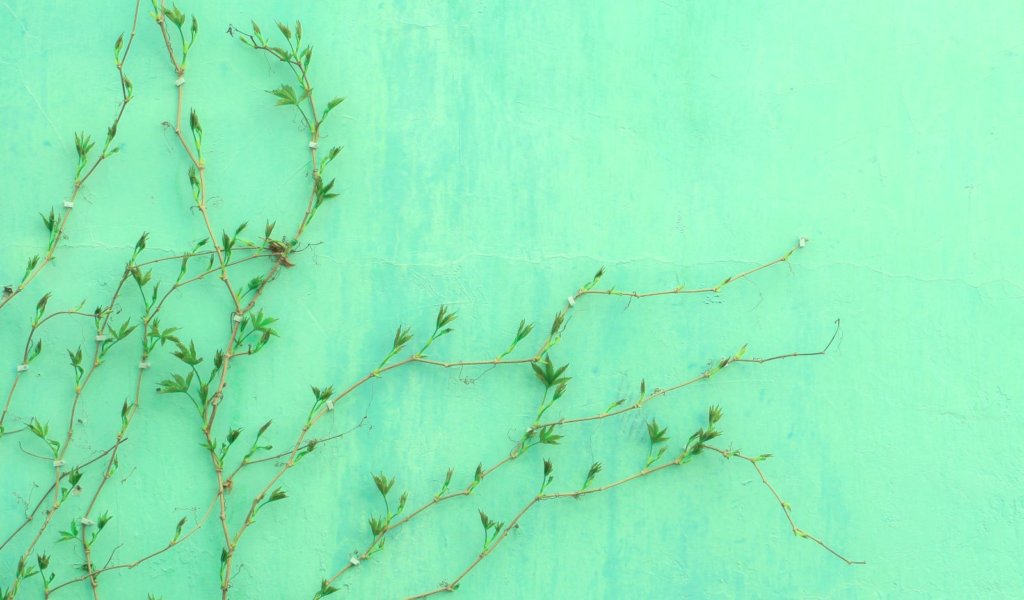
I tried to capture an image that was green with envy. Here’s what I landed on. Photo by Runze Shi on Unsplash
The researchers didn’t just ask people how they felt after the fact, they studied facial expressions and we saw real-time evidence of this disappointment with McKayla Maroney and her now-famous pout. In 2012, she was a crowd-favorite gymnast, expected to win the gold for her individual event. Instead, she made a mistake that caused her to miss the gold medal by one-hundredth of a point. She won the silver and disappointment was written all over her face.
It makes sense of course, but thinking this way, of what could have been and isn’t, what you missed out on, etc. is deadly, literally. Another study found silver medalists’ life expectancy is less than that of gold and bronze medalists and it’s posited this is due to the perceived dissatisfactory competition outcomes. These medalists were so upset about missing the gold, their lives became shorter. Yikes. So what’s the solution here? Compare down, and also maybe broaden your perspective.
I received a dose of perspective a few days ago. A woman whose career I’ve envied for a while isn’t doing so great personally. She got divorced and moved out of the home she bought with her spouse. When I heard the news, I felt pity. Instead of wishing I had this woman’s life, I felt grateful that I don’t. Yeah, her career success would be great, but I don’t want to experience what she does. Furthermore, to bring it back to my earlier comment, my relationships are healthy and fulfilling. I take it for granted that I love and am loved, but not everyone experiences that. In other words, I’m feeling the contentment my spiritual teacher advocates.
He says santośa, or contentment, means a state of proper ease. “Contentment is not at all possible if the individual is running after carnal pleasures like a beast. As a result of extroversial analysis, the objects of enjoyment go on increasing both in number and abstraction and that is why one’s mental flow never gets any rest. Under such circumstances how can one attain perfect peace of mind?”
They can’t, which is why contentment is so crucial. Santośa is not about being satisfied with the crumbs of life. It’s not appropriate to tell someone who is near-starved to be grateful for eating every three days. Everyone has a right to a full and respectful life, and at the same time, there’s something to remembering what we do have and realizing someone out there envies us.
I dream of a world where we spend more time practicing gratitude for what we do have instead of lamenting what we don’t. A world where we recognize if we saw the inner workings of other people’s lives, we wouldn’t want to trade places with them. A world where we practice contentment and compare ourselves to people who have less than us, not more.
Another world is not only possible, it’s probable.
